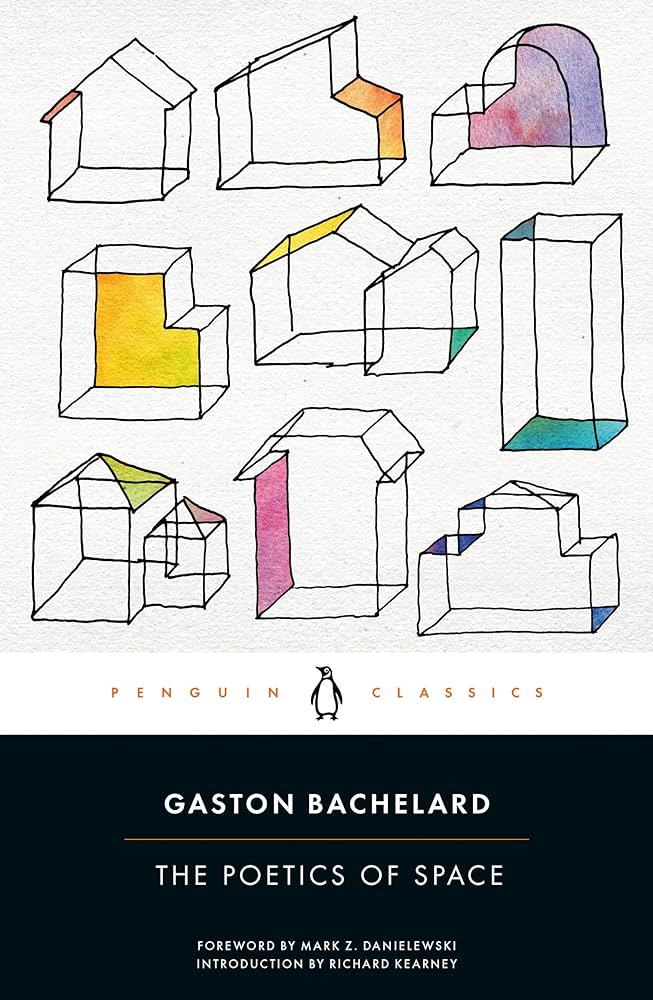
Notes and thoughts from reading ‘The Poetics of Space’ :
“In the life of a man, the house thrusts aside contingencies, it’s councils of continuity are unceasing. Without it, man would be a dispersed being.” – The Poetics of Space (pp.28-29)
- creates a feeling of stability and shrouds the ambiguity of existence with meaning
-Our relationship with this concept of home/house as the basis for our relationship with the world- and our time in those spaces defining our understanding of and sense of self. Contrasts with the concept of constant movement and decentring of Non-Spaces through the idea of certain times in our life being anchored in the memory of the places we feel most stable. Interesting way of looking at our relationship with temporality – perhaps would be beneficial to go through Heidegger’s Being and Time
“In the theatre of the past that is constituted by memory, the stage setting maintains the characters in their dominant rôles. At times we think we know ourselves in time, when all we know is a sequence of fixations in the spaces of the being’s stability – a being who does not want to melt away, and who, even in the past, when he sets out in search of things past, wants time to “suspend” it’s flight. In its countless alveoli space contains compressed time. That is what space is for.” – The Poetics of Space (p. 30)
Interesting also the idea of ‘compressed’ time within these places of memory as opposed to the accelerated time discussed in Supermodernity. This idea of time itself being ambiguous in these states might be a solid conclusion?
Curious point on memory – memories themselves (not senses/concepts) are fixed in time- this idea of being fixed in time and space – of having a stable – central point to ground ourselves in is again in stark contrast with the constant movement of Non-Space – perhaps this idea of needing a background from which the figure can appear (Merleau-Ponty) might somehow feature in this analysis/ understanding of movement
Memory becomes ‘concretized’ the more time we spend in a space- the more time we have to build a relationship, meaning and significance around it.
-How does memory play into this idea of absurdity? – Perhaps the ephemeral, fleeting nature of Non-Places is part of what makes them so much more open to ambiguity? This doesn’t mean we don’t experience absurdity in Places of memory though – so how does this absurdity come about in these environments? Through unreality? Memory not being an accurate representation of reality. Dementia as a way to look at this potentially through the work of Willaim Utermohlen
“Memory – what a strange thing it is! – does not record concrete duration, in the Bergsonian sense of the word. We are unable to relive duration that has been destroyed. We can only think of it, in the line of an abstract time that is deprived of all thickness. The finest specimens of fossilized duration concretized as a result of a long sojourn, are to be found in and through space. The unconscious abides. Memories are motionless, and the more securely they are fixed in space, the sounder they are.” – The Poetics of Space (p.31)
The house as the originator for our understandings/relationship with space – absurdity as an experience comes with age- as a child our understanding of space and being is tied to the concept of home/shelter – Tied to Merleau-Ponty’s concept of Habit?
“Life begins well, it begins enclosed, protected, all warm in the bosom of the house.” – The Poetics of Space (p.29)
“Of course, thanks to the house, a great many of our memories are housed.” – The Poetics of Space (p.30)
“The house we were born in has engraved within us the hierarchy of the various functions of inhabiting. We are the diagram of the functions of inhabiting that particular house, and all other houses are but variations on a fundamental theme.” – The Poetics of Space (p.36)
There a potential relationship here also between childhood and adulthood in terms of the experience of absurdity- with the Home relating back to a child-like space/mental place – even though we are temporal beings and can never go back to that childhood state in full – perhaps there’s an element of this childhood safety that we can retreat into/that protects us from the experience of absurdity? – Camus talks about returning to ‘hope’ to escape absurdity but perhaps to feel at home in the world is simply to have temporary respite from it – the concept of the primordial shelter itself as a shelter from the uncertainty and absurdity of life – we wrap meaning and significance around us to shelter us from absurdity the same way we build a physical shelter around ourselves to protect us from the elements- The concept of home as a mental place where we shut the rest of the world out and focus only on what is most sacred and significant to us. We can still experience absurdity inside our homes or houses, but the idea of Home as a retreat to those things that feel most stable and secure to us – the least ambiguous core of ourselves. A place where we feel safe to dream?
“I should like to point out the original fullness of the houses being. Our daydreams carry us back to it. And the poet well knows that the house holds childhood motionless ‘in its arms’.” – The Poetics of Space (p.29)
There’s an intimate personal nature to it – Its less ambiguous because it is most central to us as beings within the world – It encapsulates our most significant ties to ourselves and the world, the descriptions of these spaces are very embodied (spatial and sensorial) and very emotionally significant, they anchor us to ourselves and our lived experiences- like a house surrounded by a storm we can retreat to these memories and dream places when we’re at risk of no longer recognising the world. We recognise these spaces because they are the most familiar and constant to us. I think the word constant is important here.
“I alone, in my memories of another century, can open that deep cupboard that still retains for me alone that unique odor, the odor of raisins drying on a wicker tray. “- The Poetics of Space (p.35)
The house/Home is an allegory for our being itself?
Again Habit comes in here, potentially also in the concept (I think Camus speaks on) that we become habituated to life- this concept of home and finding safety then could be linked to our need for survival/the way we become habituated to living and our embodied nature in the world before we start thinking – thinking being the point in which the experience of absurdity creeps in.
“But over and beyond our memories, the house we were born in is physically inscribed in us. It is a group of organic habits. After twenty years, in spite of all the other anonymous stairways, we would recapture the reflexes of the “first stairway”, we would not stumble on that rather high step. The house’s entire being would open up, faithful to our own being. We would push the door that creaks with the same gesture, we would find our way in the dark to the distant attic. The feel of the tiniest latch has remained in our hands.” – The Poetics of Space (p.36)
The concept of a dream house and what this might mean – are we ‘always’ living in this house then? Does the concept of the Oneiric house really structure the transcendent meaning we ascribe to movement in the way Bachelard suggests? (Through the attic/basement analogy) – perhaps the concept of Depth of Memory might come in here? Depth is like movement through time – could there be a relationship between the idea of depth and the way we conceptualize movement
Oneiric house = house of dream-memory. that is lost in the shadow of a beyond of the real past. ( The Poetics of Space)
“To inhabit oneirically the house we were born in means more than to inhabit it in memory; it means living in this house that is gone, the way we used to dream in it” – The Poetics of Space (p.38)
The way we live is forever informed by this Oneiric house? – but this is not a house we can ever really visit -surely there is something of the absurd in that disconnect? – This is where unreality comes in?
